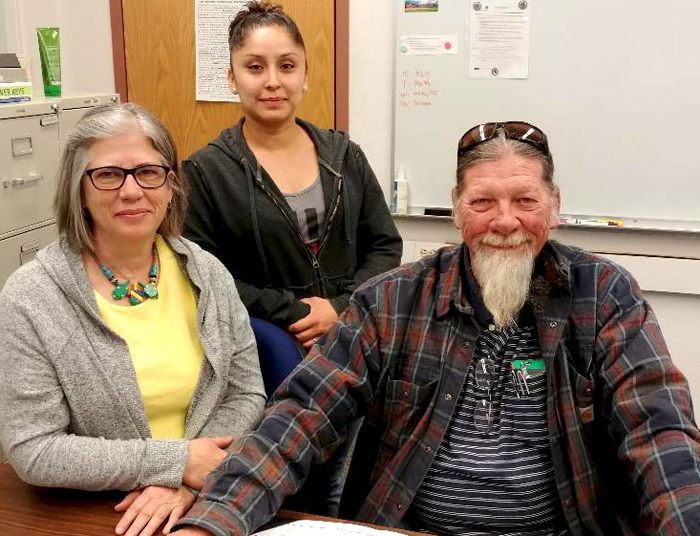High school equivalency classes at TSJC are alive and well

ALAMOSA — The loss of grant funding for Trinidad State’s Valley Campus adult education program last spring seemed dire, but after a commitment of college resources and a whole lot of hard work, the program has bounced back with new energy and focus.
Tammie Mack, Director of Trinidad State Adult Education Services, supervises high school equivalency programs (often thought of as GED) in Walsenburg and in Trinidad. Last July she assumed management of the program at the Valley Campus and by August the program was reorganized and running full steam ahead.
Heather Navarez, an Alamosa native, had begun her studies last April. She had quit school in seventh grade to have her daughter. A son followed and her dream of earning a degree was put on the back burner. She tried to take classes, work full-time and raise two little ones. She couldn’t do it. But, several years after she married her husband, Jacob, who encouraged her to go back to school, she quit her work at fast food restaurants and started on her high school equivalency degree at Trinidad State.
During the reorganization, Navarez was sent home with books and homework. She continued her English studies and passed that exam before she returned to continue in August. She was worried when she didn’t see Gary Petty, the math instructor. But he rejoined the team when he learned that students were asking for him.
“When he came back, I was so happy,” said Navarez. “It’s amazing how he teaches. He showed me those little tricks. When I came in, I didn’t know my multiplication tables, but I learned it really quick!”
Math is often the toughest subject for the students to master, but it didn’t take long for Navarez to complete her science and social studies which was amazing considering she had never attended high school. Although she had to retest in both math and science, she was determined. She never gave up. Her five children, along with her husband, were her motivation. She is raising two 3-year-olds (one is her nephew) and 5, 8 and 10-year-olds.
Mack was there the day Navarez took her math test again. “You’re ready. Just take it,” she said. When she returned to the classroom, she announced, “I passed!” Everyone was crying, hugging and celebrating with Heather.
“Heather became a believer in herself,” said Mack. “Since we reorganized the program on this campus, Heather is our first graduate.”
Navarez had grown close to Allyson Ray who is also working toward her high school equivalency. The two young women had become good friends and often studied together. “I’m going to miss my study buddy,” Navarez told Ray who is now ready to take the tests in reading/language arts and social studies. “Support to each other is key for our students,” said Mack.
Navarez completed her studies on November 17, 2017. She didn’t think she could do it, but she didn’t want her children saying, “Mom, you didn’t finish school.” When her oldest asked, “Did you do it, mom?” Navarez proudly answered, “Yes, I did it. Now it’s your turn to finish school.”
With the addition of pretests, which directly correlate with the current study books, students learn which pages they need to study to conquer the subject matter. This enables them to avoid studying material they already know, thus completing the program much sooner. Students can ask either of the two instructors, Mary Richards (reading/language arts and social studies) and Petty (math and science) for help with any of the four subjects. If more expertise is needed, the student is referred to the instructor in charge of the topic.
“Mary was my rock through the transition,” said Mack. “With the return of Gary Petty and the addition of Melynie Bundridge in the office, along with Yvette Lujan who manages the testing, it’s a great team we have. ”
Melynie Bundridge, who began work with the program in September, is responsible for student records and data. She stays in contact with Mack who works on the Trinidad Campus but visits the Alamosa Campus to supervise as needed. About the program Bundridge said, “I think it runs pretty smooth. The attitude between these two (instructors) makes the students want to come back, because they’re fun.”
The program is open 25 hours a week and students are encouraged to make it in to study at least 10 – 12 hours weekly. Currently there are 26 active students.
One day each week a visitor, often a Trinidad State instructor or a partner like Job Services or Human Services, comes in to educate the students about what is available to them. Another program change is the addition of five hours of night classes, which allows those working full-time to participate.
Classroom changes include a recognition board marking student progress, a resource table to enhance studies, tables arranged in groups, a desk area for the instructors and a coffee table. A room located away from hall traffic and noise was refurbished to house a testing center where students can test with little distraction.
Navarez appreciates the constant support and help she received from her instructors. She is now working as a home health aide after completing some online studies followed by testing. It only took her two days. She is happy to be helping people in their homes. She was proud to submit a copy of her high school equivalency degree when applying for this work.
For Navarez, the long wait is over. “I missed prom and graduation and so many things,” she said. “I can’t believe it! I can’t wait for graduation in May! I want to walk in a cap and gown.”
Caption: Heather Navarez poses with Mary Richards and Gary Petty, the instructors she appreciates so much. On November 17, 2017, she was the first student to complete her high school equivalency degree since the program was reorganized./Photo by Margaret Sanderson



